286 scholarly books by Haus Publishing and 7
have author last names that start with K
286 scholarly books by Haus Publishing and 7
286 scholarly books by Haus Publishing
7 have author last names that start with K have author last names that start with K
7 have author last names that start with K have author last names that start with K

Rida Said
A Man for All Seasons
Sabah Kabbani
Haus Publishing, 2018
Like many founding fathers, Rida Saïd (1876-1946) lived a cosmopolitan life before taking on his monumental contribution to building the modern nation of Syria. Born in Damascus in 1876, Said trained as a medical doctor in Istanbul and Paris. As a young man, he served as a field doctor with the Ottoman Empire’s army in the Balkan Wars, but he soon became disillusioned about his homeland’s foreign rulers. Like other Syrians, he was opposed to the aggressive Turkish nationalism that alienated Arabs and dreamed of a more inclusive system for his people. After his medical work in Damascus during World War I, and following the collapse of the Ottoman Empire, Said took on a critical role in establishing an independent Syria: he became a pioneering educator, advocating for the importance of providing institutions to educate the Arab people. He went on to become the first head of Damascus University, and then Minister of Education. He died in 1945, a few months before Syria finally achieved independence in 1946.
Now available for the first time in English, Rida Saïd: A Man for All Seasons tells the story of this remarkable life at the heart of a nation in deep conflict. Indeed, Saïd’s story resonates profoundly today as the Syrian people struggle for a future of opportunity and respect.
Now available for the first time in English, Rida Saïd: A Man for All Seasons tells the story of this remarkable life at the heart of a nation in deep conflict. Indeed, Saïd’s story resonates profoundly today as the Syrian people struggle for a future of opportunity and respect.
[more]
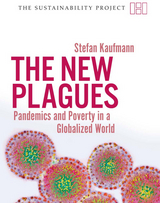
The New Plagues
Pandemics and Poverty in a Globalized World
Stefan Kaufmann
Haus Publishing, 2009
The threat from infectious diseases has increased with globalization. Throughout the history of mankind, epidemics have eradicated whole regions, started the migration of peoples and decided wars. They continue to leave their mark on societies, as well as influencing politics and economies. The New Plagues: Pandemics and Poverty in a Globalized World explores the strategies of microbes in conjunction with the economic impact of epidemics. In particular, it looks at the conflict between rich and poor with regard to outbreaks, and introduces possible strategies for containment.
[more]
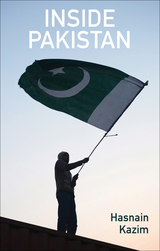
Inside Pakistan
Hasnain Kazim
Haus Publishing
Pakistan, a land with a long and storied history, is experiencing a tumultuous present. As its population expands to surpass two hundred million, its infrastructure is faltering and rampant unemployment and power outages have become the norm. The military controls much of the nation, and at the same time as the public educational system has found itself lacking needed resources, a brand of conservative and radical Islam has developed that is now a prominent political force. And yet the hope and resilience of the Pakistanis remain as strong as ever, promising the possibility of a calmer tomorrow. Hasnain Kazim, a correspondent for the current-affairs magazine Der Spiegel and the son of Indo-Pakistani immigrants to Germany, explores all of this and more in a riveting account of his four years living in and reporting from the region.
As Kazim and his wife arrived in Islamabad in 2009, they found the country of his parents’ birth riven with contradictions: a nuclear power with a tremendous gulf between the rich and poor, Pakistan has experienced a series of natural and manmade disasters in recent years alongside turbulent periods of economic growth and stagnation. What keeps the people of this Islamic society going? What hopes do they hold for the future? As Kazim spoke with Pakistanis at every level of society and of all political persuasions in search of answers to these questions, he discovered a much more complex country than the headlines of violence and extremism would suggest. Told from a sensitive and sympathetic insider’s perspective, Inside Pakistan pulls back the curtain on a section of the world that promises to play an ever more important role in years to come.
As Kazim and his wife arrived in Islamabad in 2009, they found the country of his parents’ birth riven with contradictions: a nuclear power with a tremendous gulf between the rich and poor, Pakistan has experienced a series of natural and manmade disasters in recent years alongside turbulent periods of economic growth and stagnation. What keeps the people of this Islamic society going? What hopes do they hold for the future? As Kazim spoke with Pakistanis at every level of society and of all political persuasions in search of answers to these questions, he discovered a much more complex country than the headlines of violence and extremism would suggest. Told from a sensitive and sympathetic insider’s perspective, Inside Pakistan pulls back the curtain on a section of the world that promises to play an ever more important role in years to come.
[more]
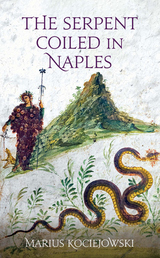
The Serpent Coiled in Naples
Marius Kociejowski
Haus Publishing, 2022
A travelogue revealing the hidden stories of Naples.
In recent years Naples has become, for better or worse, the new destination in Italy. While many of its more unusual features are on display for all to see, the stories behind them remain largely hidden. In Marius Kociejowski’s portrait of this baffling city, the serpent can be many things: Vesuvius, the mafia-like Camorra, the outlying Phlegrean Fields (which, geologically speaking, constitute the second most dangerous area on the planet). It is all these things that have, at one time or another, put paid to the higher aspirations of Neapolitans themselves. Naples is simultaneously the city of light, sometimes blindingly so, and the city of darkness, although often the stuff of cliché. The boundary that separates death from life is porous in the extreme: the dead inhabit the world of the living and vice versa. The Serpent Coiled in Naples is a travelogue, a meditation on mortality, and much else besides.
In recent years Naples has become, for better or worse, the new destination in Italy. While many of its more unusual features are on display for all to see, the stories behind them remain largely hidden. In Marius Kociejowski’s portrait of this baffling city, the serpent can be many things: Vesuvius, the mafia-like Camorra, the outlying Phlegrean Fields (which, geologically speaking, constitute the second most dangerous area on the planet). It is all these things that have, at one time or another, put paid to the higher aspirations of Neapolitans themselves. Naples is simultaneously the city of light, sometimes blindingly so, and the city of darkness, although often the stuff of cliché. The boundary that separates death from life is porous in the extreme: the dead inhabit the world of the living and vice versa. The Serpent Coiled in Naples is a travelogue, a meditation on mortality, and much else besides.
[more]
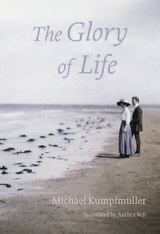
The Glory of Life
Michael Kumpfmüller
Haus Publishing, 2014
The aftermath of Franz Kafka’s love affair with Dora Diamant is legend: refusing to honor his instructions to destroy his work when he died, Diamant saved Kafka’s writings and letters that were in her possession. These were later taken by the Nazis and are still being sought today. Her importance for Kafka’s literary legacy makes their all-too-brief relationship even more intriguing. Set over the course of his last year, The Glory of Life is compelling fictional re-imagining of this fragile, tender romance.
In July 1923, Kafka is convalescing by the Baltic Sea when he meets Diamant and they fall in love. He is forty years old and dying of tuberculosis; she is twenty-five and seems to him the essence of life. After a tentative first meeting, the indecisive Kafka moves with Diamant to Berlin, a city in the throes of political upheaval, rising anti-Semitism, and the turmoil of Weimar-era hyperinflation. As his tuberculosis advances, they are forced to leave the city for the Kierling Sanatorium near Vienna, a move that threatens the paradise they have created.
The first of Kumpfmüller’s novels to appear in English after his acclaimed The Adventures of a Bed Salesman, The Glory of Life is a meticulously researched and poignant portrait of one of the most enduring authors in world literature. Beautifully crafted, this book is an evocative rumination on the power of love and friendship.
In July 1923, Kafka is convalescing by the Baltic Sea when he meets Diamant and they fall in love. He is forty years old and dying of tuberculosis; she is twenty-five and seems to him the essence of life. After a tentative first meeting, the indecisive Kafka moves with Diamant to Berlin, a city in the throes of political upheaval, rising anti-Semitism, and the turmoil of Weimar-era hyperinflation. As his tuberculosis advances, they are forced to leave the city for the Kierling Sanatorium near Vienna, a move that threatens the paradise they have created.
The first of Kumpfmüller’s novels to appear in English after his acclaimed The Adventures of a Bed Salesman, The Glory of Life is a meticulously researched and poignant portrait of one of the most enduring authors in world literature. Beautifully crafted, this book is an evocative rumination on the power of love and friendship.
[more]
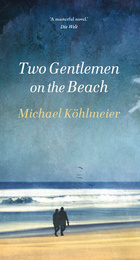
Two Gentlemen on the Beach
Michael Köhlmeier
Haus Publishing, 2016
On the face of it, Winston Churchill and Charlie Chaplin—two icons of the twentieth century—couldn’t be more different. One is the grand statesman whose resolve led a nation in the struggle against Nazi Germany, the other the world-famous actor and comedian behind The Great Dictator, whose owns roots were in poverty and hardship. But in this moving novel, they are bound by a dark secret: both suffer from depression.
When a chance encounter reveals what they share, an unusual and unlikely friendship ensues. A series of therapeutic meetings across the world, in Germany, England, and America, sees each become the other’s confidant as they talk of their “black dog days.” With the eye of a masterfully subtle narrator, Michael Köhlmeier imagines a startling friendship of unique understanding between this extraordinary pair: a friendship of the twentieth century between art and politics, humor and seriousness, but which at heart remains an understanding between two men—the poor tramp and the grand statesman—who bring together the history of the century.
When a chance encounter reveals what they share, an unusual and unlikely friendship ensues. A series of therapeutic meetings across the world, in Germany, England, and America, sees each become the other’s confidant as they talk of their “black dog days.” With the eye of a masterfully subtle narrator, Michael Köhlmeier imagines a startling friendship of unique understanding between this extraordinary pair: a friendship of the twentieth century between art and politics, humor and seriousness, but which at heart remains an understanding between two men—the poor tramp and the grand statesman—who bring together the history of the century.
[more]
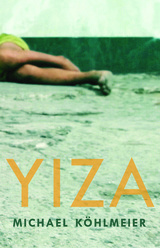
Yiza
Michael Köhlmeier
Haus Publishing, 2017
Part dark fairy tale, part mystery, Yiza is the story of three homeless street children on the run. One evening, not long after her arrival in Germany, six-year-old Yiza is abandoned at the market where she spends her days. At a shelter for migrant children she meets two boys, Schamhan and Arian, and together they run away. Trekking through snowy forests and housing settlements, they evade police custody, subsisting on the margins of society and doing whatever it takes to survive.
Both boys are protective of Yiza but are blind to the moral and emotional complexities of their actions. When Yiza falls ill they take shelter in a greenhouse and Arian spends his days begging for food and medicine, but before long they are discovered. When Yiza is illicitly taken into foster care and confined the novel reaches its brutal denouement as we see that Schamhan and Arian will do anything to be reunited with her.
Narrated in simple language and with an innocent charm that belies its social reality, Yiza is a pertinent and timely tale of displacement and suffering.
Both boys are protective of Yiza but are blind to the moral and emotional complexities of their actions. When Yiza falls ill they take shelter in a greenhouse and Arian spends his days begging for food and medicine, but before long they are discovered. When Yiza is illicitly taken into foster care and confined the novel reaches its brutal denouement as we see that Schamhan and Arian will do anything to be reunited with her.
Narrated in simple language and with an innocent charm that belies its social reality, Yiza is a pertinent and timely tale of displacement and suffering.
[more]
READERS
Browse our collection.
PUBLISHERS
See BiblioVault's publisher services.
STUDENT SERVICES
Files for college accessibility offices.
UChicago Accessibility Resources
home | accessibility | search | about | contact us
BiblioVault ® 2001 - 2024
The University of Chicago Press









